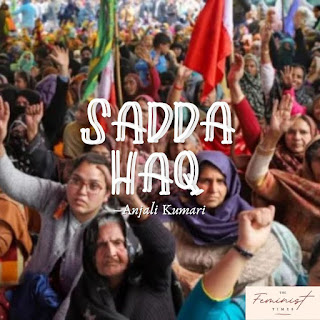SADDA HAQ
Before the pandemic, citizenship was the hot topic. While some of us
were swinging in fun at home while others were out on street protesting.
Didn’t the first category of people feared that their rights would be taken away
or they were just being apolitical?
This whole scenario points to the notion of privilege. Lets understands this
through an example. A girl named Kiran lived in an urban slum in Mumbai. Her
parents met their ends by doing household work. Kiran is the second child out
of four brothers. She left her studies at the age of 13 to look after her younger
siblings. She was married at age of 15 despite of having an elder brother. Soon
after the marriage she got pregnant at a very young age, mother of three
children at the age of 18. Her husband was abusive and never gave her the
needful things. He tortured her physically and left her in pain. This is just one
example. There are many girls like her in India. What they have in common is
that they are disadvantaged in many ways. Girls like them are vulnerable
because they are poor and uneducated. Being a woman further adds on to the
more disadvantageous position.
Her being a citizen of India has not been able to extend her rights that she was
entitled to. Citizenship has always been viewed as an egalitarian idea that
extends rights to each person and groups and removes any kind of
discrimination and subordination. But there is a wide gap between formal
extensions of rights and exercise of it. Feminism considers both classical and
modern notion of citizenship as inimical to women. Feminism as a concept
always seeks justice for women. It is an awareness of the oppression and
exploitation women face in society, at work and within family and deals with
the conscious action taken by women and men to change the situation.
The development of citizenship can be traced back to ancient Greece. It
included rights to participate in city life but failed to include women, children,
slaves etc. Aristotle considered women as irrational creatures. This continued
even in the medieval period. St. Thomas Aquinas considered woman, “as an
imperfect man and an incidental being.” I can quote many such theorists who
considered woman as greedy, impure and vain beings. French Revolution saw
massive participation of women but ironically women were denied of
citizenship rights. In 1791, Olymphe de Gouges, a French playwright published
a pamphlet entitled ‘Declaration Of the rights of women and citizens ‘which
was response to the famous Declaration of Rights of women. She said that
woman was not simply same as man, she was his equal partner. Women are
rational, can actively take part in politics and can bring change.
Only 33 of seat is reserved for women in lower house of parliament and all
state legislatives. People question the need for reservation for women in but
often ignore the cause behind it. Women have long battles before they can
claim their rights. To even fight for those basic amenities that was and is easily
available for men, is a privilege for many women. Being a man naturally makes
one inheritor of all benefits. Feminists never demands for some luxurious
things. They simply want those things that is rightfully THEIRS; without
violating someone else’s rights.
- Anjali Kumari



Comments
Post a Comment